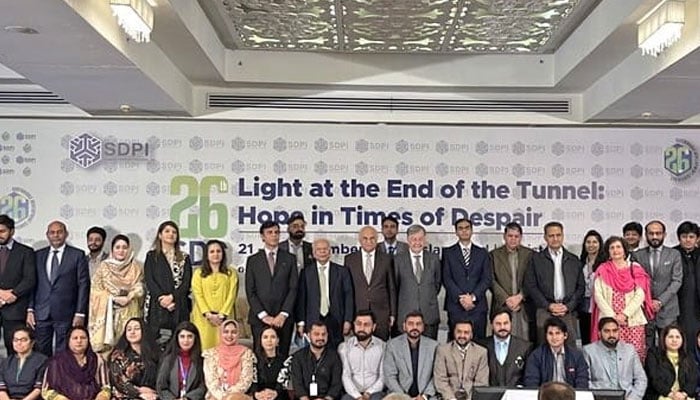Wasted harvests
That an agricultural country is facing food shortages sounds almost like an oxymoron. But Pakistan is a country where truth is stranger than fiction. In our truth, the world’s eighth largest producer of agricultural output is failing to achieve food security. On Wednesday, medical experts came together to attend the 26th Annual Sustainable Development Conference organized by the SDPI, and suggested that a change in dietary preferences and reduction in food waste can help the country reduce its ever-evolving problems of food insecurity and malnutrition. On the 2023 Global Hunger Index, Pakistan ranks 102 out of 125 countries and has a level of hunger that is ‘serious’. And it is rather alarming that the country has done nothing to improve its situation. While it is true that Pakistan is a poor country that relies mostly on food imports to meet the basic needs and that after the 2022 floods the country faced multifaceted challenges including the loss of crop and the financial inability to have a smooth flow of imports, policymakers show a complete lack of will when it comes to doing something on our own to meet the targets of food security. Pakistan needs external financing to rebuild the areas destroyed by the floods, but nothing in the world encourages the country to sacrifice its green, fertile lands for housing schemes, allowing power-hungry capitalists to increase their assets.
Cutting down mango orchards to develop posh housing societies, for example, is clearly in the hands of the Pakistan government, and policymakers here willingly approve such plans, with complete disregard to the ecological impacts such projects may have. It is extremely shocking that a year after the floods, a 50 per cent increase in the child undernutrition rate has been reported, which means that around 44 per cent of children under five are now stunted. Post the floods, unbridled inflation snatched away the little purchasing power that most people had. Not only did price hikes affect the poor, but the well-off also started feeling the pinch of inflation and ultimately watered down their donation activities, hitting the poor and the working class hard.
While countries around the world are taking initiatives to cut down food waste, Pakistan wastes 26 per cent of its total food production, something the country evidently cannot afford to do so. Pakistan has to redraft its food production and distribution policies and ensure that no person sleeps on an empty stomach. The overreliance on imported food products should be discouraged and high-quality local alternatives should be offered to people. Tackling food insecurity should be the top priority of our government, and everyone has to play their part in achieving this target.
-
 Katherine Schwarzenegger Shares Sweet Detail From Early Romance Days With Chris Pratt
Katherine Schwarzenegger Shares Sweet Detail From Early Romance Days With Chris Pratt -
 Jennifer Hudson Gets Candid About Kelly Clarkson Calling It Day From Her Show
Jennifer Hudson Gets Candid About Kelly Clarkson Calling It Day From Her Show -
 Princess Diana, Sarah Ferguson Intense Rivalry Laid Bare
Princess Diana, Sarah Ferguson Intense Rivalry Laid Bare -
 Shamed Andrew Was With Jeffrey Epstein Night Of Virginia Giuffre Assault
Shamed Andrew Was With Jeffrey Epstein Night Of Virginia Giuffre Assault -
 Shamed Andrew’s Finances Predicted As King ‘will Not Leave Him Alone’
Shamed Andrew’s Finances Predicted As King ‘will Not Leave Him Alone’ -
 Expert Reveals Sarah Ferguson’s Tendencies After Reckless Behavior Over Eugenie ‘comes Home To Roost’
Expert Reveals Sarah Ferguson’s Tendencies After Reckless Behavior Over Eugenie ‘comes Home To Roost’ -
 Bad Bunny Faces Major Rumour About Personal Life Ahead Of Super Bowl Performance
Bad Bunny Faces Major Rumour About Personal Life Ahead Of Super Bowl Performance -
 Sarah Ferguson’s Links To Jeffrey Epstein Get More Entangled As Expert Talks Of A Testimony Call
Sarah Ferguson’s Links To Jeffrey Epstein Get More Entangled As Expert Talks Of A Testimony Call -
 France Opens Probe Against Former Minister Lang After Epstein File Dump
France Opens Probe Against Former Minister Lang After Epstein File Dump -
 Last Part Of Lil Jon Statement On Son's Death Melts Hearts, Police Suggest Mental Health Issues
Last Part Of Lil Jon Statement On Son's Death Melts Hearts, Police Suggest Mental Health Issues -
 Leonardo DiCaprio's Girlfriend Vittoria Ceretti Given 'greatest Honor Of Her Life'
Leonardo DiCaprio's Girlfriend Vittoria Ceretti Given 'greatest Honor Of Her Life' -
 Beatrice, Eugenie’s Reaction Comes Out After Epstein Files Expose Their Personal Lives Even More
Beatrice, Eugenie’s Reaction Comes Out After Epstein Files Expose Their Personal Lives Even More -
 Will Smith Couldn't Make This Dog Part Of His Family: Here's Why
Will Smith Couldn't Make This Dog Part Of His Family: Here's Why -
 Kylie Jenner In Full Nesting Mode With Timothee Chalamet: ‘Pregnancy No Surprise Now’
Kylie Jenner In Full Nesting Mode With Timothee Chalamet: ‘Pregnancy No Surprise Now’ -
 Laura Dern Reflects On Being Rejected Due To Something She Can't Help
Laura Dern Reflects On Being Rejected Due To Something She Can't Help -
 HBO Axed Naomi Watts's 'Game Of Thrones' Sequel For This Reason
HBO Axed Naomi Watts's 'Game Of Thrones' Sequel For This Reason




